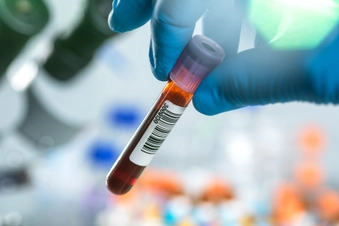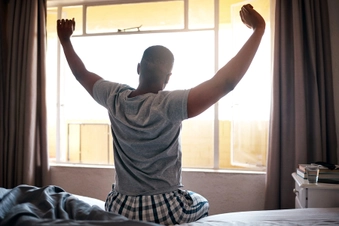Signs Your UC is In Remission

What Does UC Remission Feel Like?
There’s no one definition. You may get the sense your UC is under control when you no longer feel most of the physical and emotional symptoms it triggers. Blood and imaging tests and how you answer a symptoms questionnaire can be other strong signs of healing. Here’s why, all together, these things can point to UC in remission.

Pooping Is Less Painful
Pain and bleeding are two of the most common bowel symptoms of UC. Based on the scales that measure how severe your UC is, no (or barely there) belly cramps or bleeding when you poop can be clear signs of remission.

You Don’t Go as Often
In remission, you may only need to poop once or twice a day. That’s compared to the five or more times you go when your UC is active. The sense of urgency, or the need to get to the toilet right away, may be gone, too. Keep notes about bathroom visits. These details help your doctor figure out if your treatment is working and UC is in remission.

UC Takes Less of Your Mental Energy
You might not even realize it at first, but one of the most positive signs of remission is not having to plan your every move around UC. For instance, you may be less worried about where you’ll find a bathroom any time you leave home. You may have less anxiety about how UC affects your life in general. Feeling a bit anxious when you first go into remission is normal, but it should ease the longer you go without symptoms.

Your Quality of Life Goes Up
When you’re in remission, you may feel that your life is no longer on hold. The proof might be in your responses to a quality-of-life questionnaire from your doctor. In the Inflammatory Bowel Disease Questionnaire, for instance, you give a score from 1 to 7 (worst to best) to each of 32 questions about your symptoms, emotions, and day-to-day life. In remission, your total score is likely to be in the 170s or higher.

You Say Yes to Invitations
Your social life will get a boost when your UC is in remission. You’ll find that you’ll start to say yes to get-togethers, rather than avoiding them or having to cancel at the last minute. How UC affects you as a person, not just a patient, is something your medical team takes seriously. It’s a big part of UC questionnaires, and you can expect this score to go up when your symptoms go down.

Your Blood Test Results Improve
There are different ways your doctor can test for remission. One is a blood test that measures CRP, or C-reactive protein. It’s a key sign of inflammation. When you heal, inflammation and your CPR number go down. You might also get a test called serum amylase A (SAA). New research suggests it’s an even stronger sign of remission. But this test is not available everywhere.

Other Tests Show Healing
Until recently, doctors relied on endoscopy, an imaging test that looks for healing in the intestine. Research shows a biopsy is more exact. It’s when a sample of your cells is checked under a microscope. You have histological remission if there are no signs of inflammation or structural changes. A biopsy can also help predict a relapse because it can show hidden signs of UC.

You’re Ready to Exercise Again
Exercise drops off the to-do list for many people with UC. So it’s a positive sign when you can get back to a fitness routine. Exercise helps you protect bone density, manage stress, and lose weight. All these are key to managing UC. You’re more likely to stay in remission when you work out. Tip: Aim to walk briskly for 20-30 minutes at least three times a week and do 2-3 strength training sessions. But always check with your doctor before starting any new exercise routine.

You Sleep Through the Night
Poor sleep often comes with UC. Sometimes it’s a side effect of medication. It can also be from waking up to go to the bathroom, especially when you have diarrhea. But when you’re in remission, you don’t need to go as often. In fact, not waking up to go is a positive sign on a scale called the Ulcerative Colitis Overall Disease Severity Index.

Victory Over Fatigue
Fatigue is another common UC symptom. Besides not sleeping well, fatigue can stem from anemia, or low blood iron. UC makes it hard for your body to process iron from the foods you eat. Blood loss from active UC can also make you tired. When your UC is in remission, you should have more energy. Chalk it up to a correction of anemia, better absorption of vitamins and minerals, and quality sleep.
Show Sources
IMAGES PROVIDED BY:
1) E+/Getty Images
2) iStock/Getty Images
3) iStock/Getty Images
4) Moment/Getty Images
5) Tetra Images/Getty Images
6) iStock/Getty Images
7) Science Photo Library/Getty Images
8) iStock/Getty Images
9) iStock/Getty Images
10) Cavan/Getty Images
11) iStock/Getty Images
SOURCES:
World Journal of Meta-Analysis: “Remission endpoints in ulcerative colitis: A systematic review.”
Gastroenterology & Hepatology: “Residual Inflammation and Ulcerative Colitis in Remission.”
Journal of Patient-Centered Research and Reviews: “The Inflammatory Bowel Disease Questionnaire in Randomized Controlled Trials of Treatment for Ulcerative Colitis: Systematic Review and Meta-Analysis.”
Gastroenterology Clinics of North America: “Assessing Severity of Disease in Patients with Ulcerative Colitis.”
Clinical Review Report: Adalimumab: “APPENDIX 5: Validity of Outcome Measures.”
BMC Gastroenterology: “Serum amyloid A is a better predictive biomarker of mucosal healing than C-reactive protein in ulcerative colitis in clinical remission.”
Journal of Clinical Medicine: “Histological Scores in Patients with Inflammatory Bowel Diseases: The State of the Art.”
Gastroenterology Reviews (Peru): “Evaluation of endoscopic and histological activity as predictors of clinical relapse in ulcerative colitis.”
Journal of Crohn’s & Colitis: “Inflammatory Bowel Disease [IBD] and Physical Activity: A Study on the Impact of Diagnosis on the Level of Exercise Amongst Patients With IBD.”
Inflammatory Bowel Diseases: “Exercise Decreases Risk of Future Active Disease in Inflammatory Bowel Disease Patients in Remission.”
Nature and Science of Sleep: “Correlation Analysis Between Disease Activity and Anxiety, Depression, Sleep Disturbance, and Quality of Life in Patients with Inflammatory Bowel Disease.”
Clinical Gastroenterology and Hepatology: “Evaluation of the patient-reported outcomes measurement information system in a large cohort of patients with inflammatory bowel diseases.”
Crohn’s & Colitis Foundation: “Anemia.”
Journal of Clinical Gastroenterology: “Quality of Sleep and Coexistent Psychopathology Have Significant Impact on Fatigue Burden in Patients With Inflammatory Bowel Disease.”